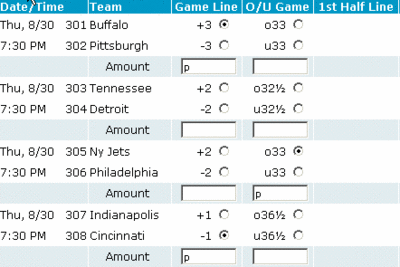Mickey, Sports Betting, and Statistics

I know a guy, let's call him Mickey, from the local bar who likes to bet lots of money on baseball. We've had some interesting conversations about sports betting. Mickey thinks he has a system to win at baseball betting. I claim he doesn't.
The last time I saw him was about month ago. We were watching the ESPN Sunday night baseball game, a game on which he had bet $3,000. He was very worried because he was in hock to his bookie for $10,000 which was due the following day. Not a problem except he told me he did not have the money.
Mickey won his bet that night on the game, and we once again had our conversation about whether he had a winning system. His system was little more than betting on the team who had a hot winning streak. I tried to explain to him that he would sooner or later fall victim to the efficient market hypothesis.
The efficient market hypothesis was developed for the financial markets, but statisticians and economists have applied it to sports betting and researched the hypothesis across all sports. Basically, the efficient market hypothesis says that if you do not have insider information, then you cannot beat the average market return. If you want a higher return, then you have to take on higher risk in your investment portfolio. Developing these ideas have won several people the Nobel Prize for economics, so it should not be dismissed out of hand.
Of course, betting on the market to make better than average returns is worse than a 50-50 proposition since betting in the financial markets has transaction costs. Betting with a bookie has transaction costs too, for he charges you the juice on each winning bet. The reason why financial markets rise over time is because they are tied to overall economic growth. You should not expect to beat the long term growth though. That is why the buy and hold strategy with a mutual fund, whose portfolio matches the overall market, and whose transaction costs are minimal, is considered to be the best investment strategy.
I'm no statistician, but I like applying elementary statistics to various situations. My interest was rekindled when I started to use an Internet sports betting bookie several years ago. I decided to invest some time studying the latest statistical research on sports betting. All the studies show the efficient market hypothesis applies, or in the case of Steven Levitt's study, it can be worse.
I like to bet pro football, and I have enjoyed a lot of success for more than ten years. In fact, last year I got hot during the playoffs and won 8 out of 11 games. I have a good deal with my Internet bookie because if I deposit my money on a certain day and bet on a certain day, the bookie does not take any of my winnings with the juice. That means given the efficient market hypothesis, my betting is like betting on the flip of a fair coin. Winning 8 bets out of 11 during the football playoffs is not the work of a genius, but the luck of a guy betting on coin flips.
I'll never go back to making extravagant bets based on my feeling that I have a system.
I have not seen Mickey since that Sunday night. I have been afraid to ask about his whereabouts. I'm pretty sure I'll never convince him of the efficient market hypothesis. I like him, and wish I could.

0 Comments:
Post a Comment
<< Home